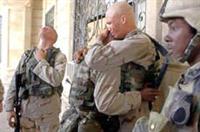 Fallujuah was a different kind of battle…
Fallujuah was a different kind of battle…
Pictured Left: Soldiers cry and comfort each other after battle. These soldiers share a bond few who have seen combat of this magnitude will ever be able to understand.
The coalition soldiers who fought in Fallujah were young, bright, fearless men with sharp wit and quick laughs that they used to quench the acid fear in their mouths over the battle to come.
An insurgent’s rocket hit the roof of a building in which they were hiding, but a miracle beam in the ceiling saved their lives, and they laughed and told stories as night fell, none of them even scratched by the fire and hot metal that had torn into two soldiers outside.
In another house they had briefly occupied that week of the battle, one of them tried on a pair of red women’s knickers and posed, a cheesy grin for the camera.
That one is dead now, shot in the chest and neck a couple of days after the pictures were taken.
@@START_COMMENTStartFragment @@END_COMMENT@@START_COMMENTStartFragment @@END_COMMENT@@START_COMMENTStartFragment @@END_COMMENTHis buddies were torn up, too – grenades rolling at their feet, bullets slicing into their bodies, outnumbered by insurgents shooting at them from all sides – only two of the eight making it out of the ambush without chunks of metal inside them. Those men, a tight squad of seven infantrymen plus a medic, who went into that house in southern Fallujah on November 13, crawling and running out moments later bleeding and dying, are not the same now.
It is not just their physical wounds and the loss of their friend; it is their scarred minds and the gaining of knowledge that most people would rather never acquire. Their nights now can be filled with memories distorted into dreams; their mornings sometimes start with shaking, tremors spreading down their arms; in the evenings, they talk to each other in confidence, quietly, but not to those who weren’t there because they will not understand.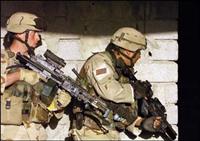
The eight men were part of an American force of more than 10,000 soldiers who launched a massive assault on the insurgent-held city, marking that week as the US military’s most intense experience of urban combat since Vietnam.
At least 53 American soldiers died along with, according to the military, an estimated 1,600 Iraqi insurgents. An unknown number of civilians also died.
Now, the 3rd squad and its battalion are in transit, expected home by the end of the month. After a year that saw the 2nd Battalion of the 7th Cavalry fight in two of the biggest battles of the war so far – Najaf and Fallujah – they tell themselves they will not become a messed-up generation of American veterans – the Deer Hunters and Rambos – or like the vets who appear in newspaper articles, the ones who have gone home from Iraq and shot themselves in their backyards, beaten their wives or started bar fights.
That’s not going to happen to them, they say. But for some, it won’t be so easy lying in soft beds with caring wives, jagged flashes of killing and dying in their minds.
Those who have been home on leave know that home isn’t necessarily where they will find peace and clarity. Medical experts in the United States say that such returning veterans may be experiencing the first signs of Post-Traumatic Stress Disorder (PTSD) and that these soldiers may have more severe symptoms than their Vietnam counter-parts. US troops in Iraq are in almost constant danger from insurgent attacks.
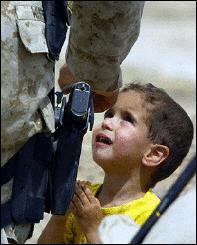 “You go to church,” says Staff Sergeant Carlos Santillana, recalling his two-week leave back home in Abilene, Texas, in early December. “And they’re like, `Hey, we’d like y’all to welcome back our hometown hero. He’s been over there in Iraq.’
“You go to church,” says Staff Sergeant Carlos Santillana, recalling his two-week leave back home in Abilene, Texas, in early December. “And they’re like, `Hey, we’d like y’all to welcome back our hometown hero. He’s been over there in Iraq.’
“And you’re just thinking to yourself, this is an irony or an oxymoron. In the Bible it says thou shalt not kill. I’m a hometown hero and I just killed a whole bunch of people. And they’re welcoming me back in a public place.”
Santillana has killed more men than he has seen years. He is 25. He believes he has killed 26, perhaps 27 people. You count things like that – killing people.
In the weeks that have passed since the battle in Fallujah, one of the men who entered the building filled with insurgents has been buried; two have had surgery and one is living with a right hand that will never properly open and close again. Three returned to the squad after medical care.
Only two were not injured that day. The unit is probably as combat-experienced as any in the battalion. Its men certainly are the most decorated, having received two of only three Silver Stars awarded to soldiers in the 800-soldier battalion over the past year in Iraq.
The thin-faced Santillana is close to Specialist Benny Alicea, who has just received a Silver Star for his extraordinary courage on November 13 and who is still trying to find answers about what has happened.
“I just signed off on life,” says Alicea, who watched his friend Jose Velez die in front of him on November 13, who felt bullets going past his ear, who carries three bits of shrapnel around in his upper legs from that day. Velez won the squad’s other Silver Star, posthumously. “That’s the biggest problem I been having when I got back is that, hey I’m still here. At that point in time I just decided I’m dead. I just remember telling myself, hey – my wife’s name is Cheryl – I love you, Cheryl. I told myself, this is my day, you just give up, you just decide you ain’t going to make it, then you just accept it.”
But none of the bullets or fragments of grenade killed him, and Alicea was left holding an acceptance of his own death that he doesn’t know what to do with.
“I don’t even feel like I’m going home yet ’cause I pretty much didn’t plan on going home,” he says. “I don’t know what you’re supposed to do if you make it alive out of something like that.”
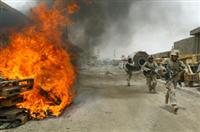 There’s nothing surprising or unusual about the way men such as Santillana and Alicea are thinking and feeling. That’s what the war in Iraq is doing to some men who fight there. A study published last year by US military medical researchers into combat infantry soldiers returning home from Iraq shows that while many will adjust, up to 19.5 percent will face “moderate or severe” psychological problems.
There’s nothing surprising or unusual about the way men such as Santillana and Alicea are thinking and feeling. That’s what the war in Iraq is doing to some men who fight there. A study published last year by US military medical researchers into combat infantry soldiers returning home from Iraq shows that while many will adjust, up to 19.5 percent will face “moderate or severe” psychological problems.
Soldiers fighting in Iraq have seen more combat than any American troops since Vietnam. And just as that war damaged the psyches of thousands of young Americans, so the war in Iraq is mainlining trauma into those who have been there.
“I don’t know who I could talk to because no one really knows what it’s like, you know what I mean?” says Lieutenant Dan Kilgore, 24, who commands the platoon of which Santillana’s squad is a part. As a young officer, Kilgore is perhaps more alone than his men. They’re a brotherhood. He’s their leader. The chain of command creates an inevitable distance between them.
“Even talking to a veteran [of past wars], they don’t know what it’s like because it’s a different war. I’m just going to have to deal with it on my own and think about it a lot. Even my best friend that I grew up with from the age of three? He has no idea. He’s training for his PhD for math. He has no idea or any way to relate.”
Kilgore is responsible for more than 30 men. He saw a change in some immediately after Fallujah. “I’ve got some guys who act a lot different than they did before,” he says.
Velez was the only soldier from the battalion killed by the enemy in Fallujah. Santillana’s squad and Kilgore’s platoon are the hardest hit by his death. Some of the men can’t stop thinking about the tubby kid with the thick glasses who wanted to fit in so much he volunteered right off to carry the squad’s heavy machine gun, something no one wants to do.
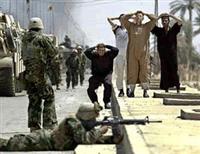 That day, Santillana’s squad went alone into a house from which they believed a single insurgent was firing. There were at least five insurgents in a single room, others swarming around the back and a sniper across the street. The Americans were surrounded and overwhelmed. Within moments, they were forming a pile of injured outside the building, some firing their rifles even as they bled into the mud. Velez fired every round he had as he tried to protect his buddies. Then, the sniper found the exposed spot below his neck, and Velez lay dead on the street.
That day, Santillana’s squad went alone into a house from which they believed a single insurgent was firing. There were at least five insurgents in a single room, others swarming around the back and a sniper across the street. The Americans were surrounded and overwhelmed. Within moments, they were forming a pile of injured outside the building, some firing their rifles even as they bled into the mud. Velez fired every round he had as he tried to protect his buddies. Then, the sniper found the exposed spot below his neck, and Velez lay dead on the street.
When the squad’s survivors went back to Camp Taji after the battle, Alicea locked himself in his room for two days. The troops at Taji live in trailers, giving them some privacy. Alicea had bunked next to Velez.
“I blame myself because maybe I should have stayed in that building firing and not come out,” he says, sitting quietly in a trailer. There’s a scar on his left cheek where the ricocheting fragment of a bullet cut him. “I knew I would have got hit. But maybe it would have made the situation outside of that room better.”
With the unwarranted guilt come its henchmen: Memories and dreams. Alicea’s dreams, like those of the other soldiers, are troubling him less often than they did. The remembrances stay. “I think about it and I start breathing heavy and I start shaking and everything,” he says, his tight New England accent competing with the casual tones that so many infantrymen seem to pick up, like airline pilots over the intercom.
From the brute horror of the four, five or six minutes of that day – no one can quite remember how long it took for their lives to change – there is one image Alicea can’t shake: Velez lying dead in the street as Alicea and the others fought for their lives. “I just got mad because he had his face in the water, in the streets.”
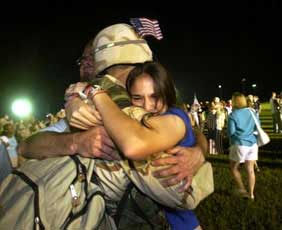 Santillana went on leave soon after Fallujah. His wife, Rebecca, has a master’s degree in psychology and is his best friend. He tells her everything, and she understands, telling him of studies she’s read, saying all the right things, listening. When he would get up in the middle of the night in December to bleach his memories with television shows or root around for tools in his freezing cold garage, she would go and find him and lead him gently back to bed, where he would start shadow-boxing with the past again. He asked one thing of her: Never to wake him up.
Santillana went on leave soon after Fallujah. His wife, Rebecca, has a master’s degree in psychology and is his best friend. He tells her everything, and she understands, telling him of studies she’s read, saying all the right things, listening. When he would get up in the middle of the night in December to bleach his memories with television shows or root around for tools in his freezing cold garage, she would go and find him and lead him gently back to bed, where he would start shadow-boxing with the past again. He asked one thing of her: Never to wake him up.
One day they were in Austin, Texas, visiting her brother. Santillana lay down on the floor of the guest room and fell asleep. Rebecca forgot his request and shook his shoulder. “And I, like, sat up real quick and I’m just sitting there shaking and I’m just looking and I knew it was her but I didn’t know it was her – it was like I just wanted to swing at whoever it was who was waking me up.”
Santillana pauses, gazing at the floor of the trailer. “I can’t believe I almost, I can’t believe I even thought about hitting my wife.”
One man who was caught in the ambush in the house in Fallujah had a job different from the others. Specialist Scott Cogil is the platoon’s medic and was with Santillana’s squad when they burst into the house. No one, including Cogil when he’s thinking straight, believes Velez could have been saved. Cogil has won the Bronze Star for his bravery, for saving Sergeant Akram Abdelwahab’s life and for firing back at the enemy as much as anyone there. Guilt isn’t always logical. Velez used his fighting skills to save lives, Cogil feels. Cogil feels he owed it to Velez to use his medical skills to save him. “It was my responsibility to take care of him,” says the soft-voiced 21-year-old, whose parents split up days before he rode into Fallujah. He pauses and his voice lowered further. “And I didn’t do it.”
Cogil and Santillana were the only ones not injured in the fight. Cogil talks like he almost wishes he had been, or perhaps wonders what’s so special about him that he wasn’t. “How come I never got hurt? Everybody else got hurt. I was right behind him [Velez]. I was in front of him. I was with him all the time. Bullets hit all around me and never hit me.”
The days after Fallujah passed slowly, building up to the last one. The men went out on patrol, never seeing an enemy that only days before February’s awards ceremony took another soldier. This time, a huge hidden bomb ripped up from beneath an Abrams tank, the toughest vehicle the army has, killing the driver. He was the battalion’s 12th lost soldier.
And in the unit’s final days in Iraq, on February 25, they lost a 13th — a 22-year-old specialist rifleman from Oklahoma named Adam Brewer. He was killed by another bomb.
“For me, this one was harder than the last,” Major Scott Jackson, the 2nd battalion’s second in command, says.
“I can’t explain why for sure, part is due to the proximity to the end of our tour, part is due to the cumulative losses within the battalion, and a large part I can’t put a label on.”
Towards the end, when they weren’t out on patrol, they were fixing their prematurely aged Bradleys and tanks, eating good food at the chow hall where sports banners hung from the ceiling, working out, listening to music – Santillana shifted his previously hard-core tastes to flute and bagpipe music – and thinking about what was to come.
And sometimes, they thought about the men they had killed in Najaf and Fallujah over the past year.
None of them feels he did wrong by killing. It was a job – it was us or them – but that does not necessarily insulate a person from the pain of having ended another’s life.
“They’re doing their job and we’re doing ours but ultimately we gotta come out ahead,” says Santillana. He has given it a lot of thought.
“It’s just the way the world works. I mean, their job is not in the best interests of the world. They’re not doing the right thing. But you see, that’s the thing: They think they are. And we can say we’re doing the right thing, but nobody knows if we ultimately are. Are we going to change this part of the world? Are we going to change their government for the better or for the worse? Is it going to be better when we leave here? Is it going to be worse whenever we leave here? We don’t know that. Nobody ever knows who’s ultimately fighting for the better cause.”
Santillana says he didn’t give much thought before to those he killed. The death of a friend, Velez, humanized those he was killing.
“You don’t stop what you’re doing, but just for a second you wish there were another way. Would you all listen to some peace talks or some s***? Can you all find an easier way to do this besides me having to kill you?”
It’s too early to tell what the cost will be for the victors of Fallujah. Santillana, Alicea and Cogil all believe they will adjust to life back home. Santillana probably will become a recruiter, partly to avoid putting his family through another year like the last. Alicea is thinking about trying to join the Special Forces, where he can work in an even smaller close-knit group; besides that, his focus will be on Cheryl. Cogil wants out of the army. The decorated war hero doesn’t like being shot at, doesn’t want to go through it again. He’ll go back to Fort Hood, finish out his time in the army, go to college and visit a house in Rantoul, Illinois, missing the father who left home while Cogil was at war.
The men say they’ll visit Velez’s grave in his hometown of Lubbock, Texas. The platoon is looking for a tattoo artist skilled enough to stain Velez’ face into the hide of anyone who wants it there for life.
There are hopes – or are they anxieties? The three men hope people back in the United States will refrain from asking them over and over how they are, what it was like over there and whether they have killed, the questions that come like machine-gun rounds wherever they go. They hope they will fit in with their families again. They hope they won’t fall apart.
“I’m scared to death that for some reason maybe some day something will snap and I won’t be able to control it,” Santillana says. He has only seen his son Jaden for four months of the child’s life. “I’m scared because I don’t want that to happen. I love my family and I don’t want them to have to leave me not because they can’t love me any more but leave me because I’m not physically capable of being around them, because I’m losing my mind, punching holes in the walls and waking up in the night screaming and hollering. So far I’ve done a little bit of that.”
Santillana and his buddies could snap, or they could keep it together. Only the coming months will tell. Perhaps one lesson from the dirty streets of Fallujah will help them navigate the clean streets of America more than any other: Years before most young men, they have seen what matters in life.
ATTENTION READERS
We See The World From All Sides and Want YOU To Be Fully InformedIn fact, intentional disinformation is a disgraceful scourge in media today. So to assuage any possible errant incorrect information posted herein, we strongly encourage you to seek corroboration from other non-VT sources before forming an educated opinion.
About VT - Policies & Disclosures - Comment Policy



